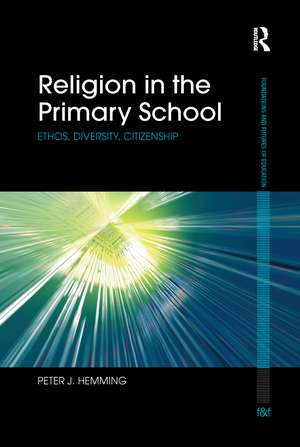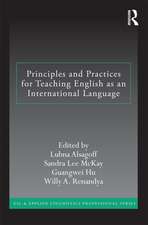Religion in the Primary School: Ethos, diversity, citizenship: Foundations and Futures of Education
Autor Peter Hemmingen Limba Engleză Paperback – 7 iun 2017
This book aims to address this gap by exploring the social and political role of religion in the context of the primary school. Drawing on original ethnographic research with a child-centred orientation, comparisons are drawn between Community and Roman Catholic primary schools situated within a multi-faith urban area in the UK. In doing so, the study explores a number of ways in which religion has the potential to contribute to everyday school life, including through school ethos and values, inter-pupil relations, community cohesion and social identity and difference. At the centre of the analysis are two key sociological debates about the significance of religion in late modern societies. The first is concerned with the place of religion in public life and the influence of secularisation and post-secularism on the relationship between religion and schooling. The second relates to the increasingly multi-faith nature of many national populations and the implications for religious citizenship in educational settings.
Religion in the Primary School will be a useful resource for academics, researchers and students as a key addition to existing knowledge in the disciplines of education, sociology and human geography. It will also be of value to both policy-makers and educationalists interested in the role of religion in schools and the implications for the wider community and society in a range of national contexts.
| Toate formatele și edițiile | Preț | Express |
|---|---|---|
| Paperback (1) | 402.66 lei 6-8 săpt. | |
| Taylor & Francis – 7 iun 2017 | 402.66 lei 6-8 săpt. | |
| Hardback (1) | 1162.25 lei 6-8 săpt. | |
| Taylor & Francis – 12 mar 2015 | 1162.25 lei 6-8 săpt. |
Din seria Foundations and Futures of Education
-
 Preț: 294.92 lei
Preț: 294.92 lei -
 Preț: 272.63 lei
Preț: 272.63 lei -
 Preț: 294.54 lei
Preț: 294.54 lei -
 Preț: 288.34 lei
Preț: 288.34 lei -
 Preț: 395.00 lei
Preț: 395.00 lei -
 Preț: 397.88 lei
Preț: 397.88 lei - 12%
 Preț: 331.87 lei
Preț: 331.87 lei -
 Preț: 402.66 lei
Preț: 402.66 lei - 18%
 Preț: 1005.04 lei
Preț: 1005.04 lei -
 Preț: 478.41 lei
Preț: 478.41 lei - 17%
 Preț: 257.23 lei
Preț: 257.23 lei - 18%
 Preț: 1002.60 lei
Preț: 1002.60 lei -
 Preț: 356.18 lei
Preț: 356.18 lei - 18%
 Preț: 1108.24 lei
Preț: 1108.24 lei -
 Preț: 347.54 lei
Preț: 347.54 lei -
 Preț: 441.96 lei
Preț: 441.96 lei - 18%
 Preț: 1000.76 lei
Preț: 1000.76 lei -
 Preț: 386.30 lei
Preț: 386.30 lei -
 Preț: 352.15 lei
Preț: 352.15 lei -
 Preț: 451.59 lei
Preț: 451.59 lei -
 Preț: 381.17 lei
Preț: 381.17 lei -
 Preț: 417.81 lei
Preț: 417.81 lei - 18%
 Preț: 1109.51 lei
Preț: 1109.51 lei - 31%
 Preț: 762.57 lei
Preț: 762.57 lei - 18%
 Preț: 705.87 lei
Preț: 705.87 lei - 18%
 Preț: 842.81 lei
Preț: 842.81 lei -
 Preț: 420.77 lei
Preț: 420.77 lei - 18%
 Preț: 1108.73 lei
Preț: 1108.73 lei - 28%
 Preț: 821.29 lei
Preț: 821.29 lei -
 Preț: 413.95 lei
Preț: 413.95 lei -
 Preț: 474.52 lei
Preț: 474.52 lei - 26%
 Preț: 762.57 lei
Preț: 762.57 lei
Preț: 402.66 lei
Nou
Puncte Express: 604
Preț estimativ în valută:
77.06€ • 83.67$ • 64.73£
77.06€ • 83.67$ • 64.73£
Carte tipărită la comandă
Livrare economică 22 aprilie-06 mai
Preluare comenzi: 021 569.72.76
Specificații
ISBN-13: 9781138090118
ISBN-10: 1138090115
Pagini: 164
Dimensiuni: 156 x 234 x 9 mm
Greutate: 0.45 kg
Ediția:1
Editura: Taylor & Francis
Colecția Routledge
Seria Foundations and Futures of Education
Locul publicării:Oxford, United Kingdom
ISBN-10: 1138090115
Pagini: 164
Dimensiuni: 156 x 234 x 9 mm
Greutate: 0.45 kg
Ediția:1
Editura: Taylor & Francis
Colecția Routledge
Seria Foundations and Futures of Education
Locul publicării:Oxford, United Kingdom
Public țintă
Postgraduate and ProfessionalCuprins
1. Introduction 2. Religion, Citizenship and Society 3. Education, Religion and Ethnography 4. School Ethos and Religion 5. Post-Secular Values 6. Meaningful Encounters 7. Cohesive Communities 8. Religious Difference and Citizenship 9. Conclusion
Notă biografică
Peter J. Hemming is a lecturer in the School of Social Sciences at Cardiff University, UK, where he teaches sociology of education and childhood studies. Peter’s research interests include children and young people, schools, power and identity, faith-based education, citizenship studies and sociology of religion. He is also a former primary school teacher.
Descriere
Religion and its relationship to schooling is an issue that has become more and more topical in recent years. In many countries, developments such as the diversification of state school sectors, concerns about social cohesion between ethnic and religious groups, and debates about national identity and values have raised old and new questions about the role of religion in education. Whilst the significance of this issue has been reflected in renewed interest from the academic community, much of this work has continued to be based around theoretical or pedagogical debates and stances, rather than evidence-based empirical research.





